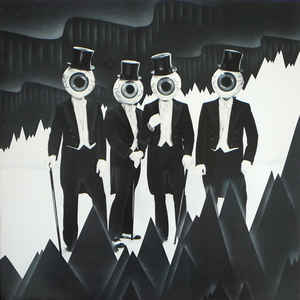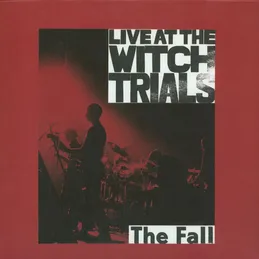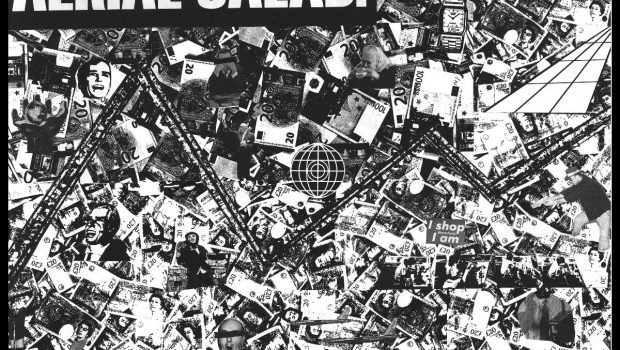 A friend of mine works at the BBC and from time to time, she has to review historic children’s TV shows before they are re-released, just to check for inappropriate storylines, jokes, politically incorrect content and sinister special guest appearances by those on the wrong side of Operation Yewtree.
A friend of mine works at the BBC and from time to time, she has to review historic children’s TV shows before they are re-released, just to check for inappropriate storylines, jokes, politically incorrect content and sinister special guest appearances by those on the wrong side of Operation Yewtree.
I couldn’t help but think of her when I listened to the Residents’ upcoming re-release…
If I walked into her office and pitched re-releasing a 1970s album called ‘Eskimo’ made up of bleak Arctic soundscapes interspersed with the most contrived gibberish mixed with the most insensitive and patronising stereotype – oh, and more than a few advertising slogans (including Coca Cola, Toyota, Charmin and McDonalds) – as well as crude a-capella impersonations of, amongst other things, the sounds of a live birth and a dog sled driven by a man repeatedly shouting “mush”, I am pretty sure she’d have some sort of embolism.
The correct response would be to laugh me out of the door, then listen to the record, then laugh some more – because this album is a joke. Not in the same way that the latest X-Factor winner’s album delivers a cruel parody of music, but in a ferocious satire that for most of its running time barely qualifies as music to anyone without a degree.
Calling it “avant garde experimental” doesn’t do it justice by a country mile – it’s more like surrealist comedy. It reaches the heights of the incomprehensible conceptual work that you get when someone, like Picasso, gets so good at their art that it doesn’t even look like art anymore and you have to go home in disgust and stew about it for a while before you come back to look again and realise that actually, it’s absolutely bloody genius.
While packaged (and regarded) as a satire on the circumstances and recent history of the far-North American indigenous people, I think that even this aspect of the album is incidental. The sleeve notes include the statement ‘All of the stories on this disc are told in the past tense. This is because the Eskimo… was “rescued” from its “miserable” lifestyle by welfare in the late 1960s [and] has been relocated entirely into government housing and now spends most of the day watching reruns on TV.’.
But while this provides a veneer of social commentary over something that seems (and let’s be honest, probably is) hugely culturally insensitive, the true targets of the satire are – as with much other Residents’ material – both 20th century consumerist capitalist culture and more importantly the listener – and probably themselves, too. Does this make it OK? Probably not – although perhaps a little more OK than the lazy stereotypes, straight-washing white-washing and misogyny of modern Hollywood.
You’d be forgiven for having completely forgotten that this is supposed to be a music review – and I could try to tell you that Eskimo sounds like an homage to Pictures at an Exhibition devised and performed by Animal from the Muppets, John Cage on magic mushrooms and a pantomime dame acting a nervous breakdown – but Eskimo is one of those things that defies description and just needs to be heard – or rather, experienced.
The album is devised as an experience – made up of not just the soundscapes but also the (ridiculous) liner notes which describe the story that the music purports to tell. Unfortunately, this experience of listening, as recommended, to the whole album “with headphones while reading the enclosed accounts of what you hear” is an approach to music listening which has been completely eroded over the forty years since Eskimo’s release by a thousand cuts – including the shrinking of music packaging from vinyl size to CD size; the shrinking budgets (and profit margins) on more modern records, meaning sleeve liners became expensive fat to be trimmed; the move to digital music doing away with packaging entirely; vast digital storage meaning that a transition to playlists, rather than albums became a norm; the eradication of boredom and transition of music appreciation from an active pursuit to being a background to other pursuits – and finally smartphones and social media monopolising everyone’s attention to the extent that we can’t concentrate for longer than a song from the ‘Commercial Album’.
“What’s the ‘Commercial Album’?” I hear absolutely nobody ask, as my contrived segue falls flat; “Well, it’s another Residents album out for re-release”, I say, irretrievably wedded to the premise.
The ‘Commercial Album’ is made up of songs in a more conventional format, with conventional arrangements of keyboards, guitars, percussion and vocals – though hardly conventional songs. The concept is, in part, a satire of the “Top 40” format, with forty individual tracks, with the twist that, given most pop songs are three minutes long, and made up of verse-chorus-verse-chorus-verse-chorus, these forty songs have all been produced as one minute jingles, without repetition. The liner notes (once again, a source of significant mirth) state that you should “set your turntable to repeat each track three times to convert these jingles to pop songs”.
I find the music hilariously funny. Anyone who doesn’t believe music should be funny should probably avoid the Residents; anyone who doesn’t believe music can be funny must listen to the Residents – although they might do better to start with Meet the Residents, or Third Reich and Roll (also recently re-released).
The irony of the Residents anonymity is their utterly unique and yet recognisable approach to music and its packaging, which continues with the re-released albums and their wealth of bonus material – both the huge amounts of additional music across both releases and also the interesting and insightful additional descriptive liner notes and essays included in the liners of each album.
Design is an iterative process, and there are so many small details that contribute to these CD’s and the original albums being more than just products, more than just CD’s, more than just music – I would agree strongly with those who refer to it as art. Even after forty years, the Residents’ work is hilariously disturbing, outrageous, utterly uproariously insane art.
The Residents Eskimo box set and Commercial Album box set are each released on January 25th 2019 through Cherry Red Records.












